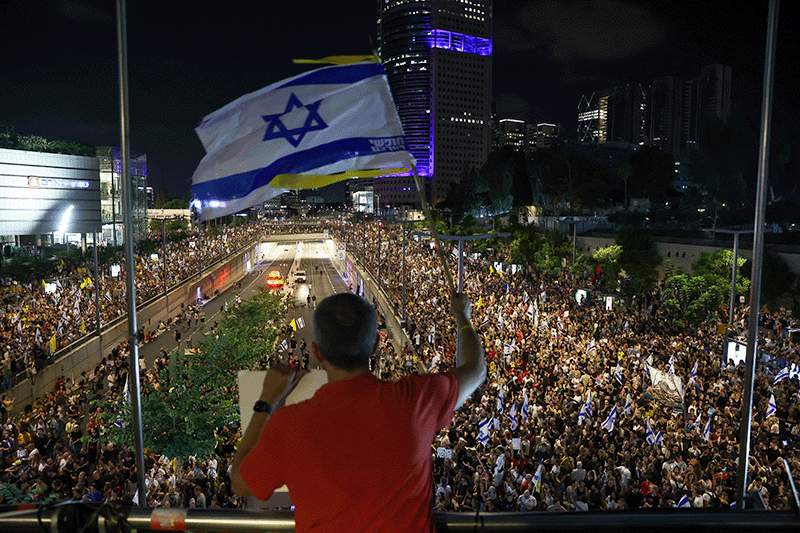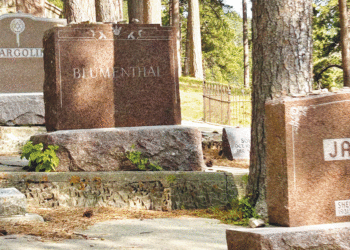On a visit to Israel more than 20 years ago, I found myself in a beautiful home located on a mountain ridge a few miles west of Jerusalem. It was a Saturday night, Shabbat had ended, and in the spacious living room I found a copy of Haaretz, the large weekend edition.

The woman of the house, a scholar known to many in our local Jewish community from her tenure at the University of Minnesota, responded to my question about her news reading habits. Haaretz was known for its reportage on Israeli depredations in the occupied Palestinian territories. Many of its writers — Amira Hass, Gideon Levy, et al. — provided Israelis with coverage sharply critical of the occupation.
My host wanted to read such reports and commentaries.
She responded, “I never want to say that I didn’t know what was happening.”
Of course, her words consciously echoed those of German citizens after World War II, who proclaimed regarding the Nazi atrocities: “We knew nothing about that.”
This woman, a scholar of the Shoah, was not equating the Israeli government with the Third Reich; however, she was making a point about civic responsibility when your government is engaged in repression.
And now we are horrified by Israel’s war on Hamas in the Gaza Strip, which has killed tens of thousands of Palestinian civilians and reduced much of the small coastal enclave to rubble. There has been a steady drumbeat of reports on mass famine and disease spreading during the IDF onslaught, which is approaching the one-year mark.
Most Middle East scholars and human rights observers, in this country and abroad, have said that Israel’s war is intended to make Gaza uninhabitable for Palestinians, and that the IDF actions amount to “major war crimes” or “genocide.”
On Oct. 7, Jews, in Israel and throughout the Diaspora, will gather to remember the 1,200 souls murdered by Hamas attackers in the towns and kibbutzim near Israel’s border with Gaza. Israel remains in turmoil over the recent murder of six hostages found in a Gaza tunnel and the 100 hostages, either living or dead, that were abducted in the Oct. 7 terrorist attack and languish in Gaza. Israelis want their government to agree to a cease-fire that would free the hostages; on Sunday, Sept. 1, around 300,000 protesters crowded the streets of Tel Aviv to make their view known.
To learn more about the dismal situation in Israel and Palestine, I talked with Jeremy Ben-Ami, founder and president of J Street, a lobbying group that bills itself as “pro-Israel and pro-peace.” I spoke by telephone in late August with Ben-Ami, whose connection to Israel goes back 130 years to the first aliya when his great-grandparents were among the first settlers in Petach Tikva, and his grandparents were one of the founding families of Tel Aviv, as per his official bio.
Ben-Ami will travel to the Twin Cities this month for a Sept. 12 talk at Mount Zion Temple. I last interviewed him in 2015, when he spoke at the U of M; in 2017, I attended the J Street conference in Washington, D.C.
I began the interview by asking Ben-Ami about a May 28 statement he issued. The title was “Mr. President, Enough Is Enough.” The statement castigated the Hamas actions on Oct. 7, then noted, “To our great regret, the response of Prime Minister Netanyahu’s government has too often crossed the line from legitimate self-defense and pursuit of justice to itself becoming the source of horrific suffering and destruction. … It is time for this war to end. It is time for a negotiated ceasefire that brings home the hostages and halts the fighting. It is time for a deal that allows for a surge of humanitarian assistance into Gaza to meet the massive needs of the civilian population.”
Ben-Ami’s statement also urged Pres. Biden “to withhold shipments of offensive weapons to press Netanyahu and his allies to adhere to the rules of war, to American law and to the moral standards we expect from a democratic ally.”
Asked about what has changed since the May 28 statement was issued, Ben-Ami commented that “tens of thousands more people are dead, many more hostages are dead. It’s just tragic where we are at. It is so imperative to find a way to come to a conclusion to this fighting.”
I observed that the organized Jewish community is in a state of near panic regarding the pro-Palestinian protests that have proliferated on college campuses and elsewhere. What has J Street been doing amid this upsurge in popular protests?
“We have a very active college campus program: It’s called J Street U. We’re active on 60 or so campuses, and we are going to be dramatically ramping up our programming and hiring some new staff. Our goal is to provide a safe space for Jewish students who are not comfortable necessarily in the protest encampments, though they may share some concern about the war and the way it’s been prosecuted.”
Ben-Ami said J Street U is also addressing the needs of those students that are “not comfortable at some of the more traditional Jewish programs and organizations that tend to be a little bit more hawkish and tend not to express empathy for the Palestinian people. It’s very important, I think, for there to be a voice in the middle. I think it’s the mainstream center of the American Jewish community that recognizes Israel’s right to self-defense and its need for security, and at the same time also feels that Palestinian civilians have suffered far too much in the course of these 10 months, as well. And that space in the middle is where J Street is planting its flag. I think that’s also the space where the majority of Jewish college students are at.”
In the course of my research on J Street, I found that there have been dissenting voices within the organization.
In a Feb. 9 article on the website of Jewish Currents, a leftist Jewish publication, Mari Cohen wrote that since the Oct. 7 Hamas attacks on Israel, “at least seven staff members have left J Street, with at least four making it known to colleagues that the liberal Zionist lobby’s lack of support for a cease-fire in Israel’s war on Gaza had motivated their resignation, according to three former and current J Street employees. These departures are among several indications that J Street’s three-and-a-half months of support for the war … sparked significant dissent from the group’s employees and supporters. In late November, 19 employees signed an internal letter to the executive team asking the group to call for a cease-fire. In the letter, obtained by Jewish Currents, the staffers describe themselves as ‘increasingly troubled by our organization’s reluctance to commit to an end of violence and suffering.’”
The Jewish Currents article — titled “J Street’s Pro-War Stance Prompts Staff Departures” — noted that, after Oct. 7, “J Street repeatedly issued statements affirming its support for Israel’s right to ‘defend itself’ and to ‘disarm Hamas’ so long as it did not violate international law in the process — a position that, the November 29th staff letter argued, ‘is not tied to reality.’ Given that Israel has been accused of frequent international law violations, the letter claims that a ‘moral and lawful Israeli-led military campaign is wholly unachievable’; it also described certain statements by Israeli leaders as demonstrating ‘genocidal intent’ against Palestinians in Gaza.”
Regarding the dissent within J Street, as outlined by Jewish Currents, Jeremy Ben-Ami issued a statement to the publication and said that the lobby had “welcomed” the November letter as an affirmation of the “broad spectrum of opinion on these difficult issues within the organization’s leadership and staff.”
The ongoing suffering in Israel and Palestine is deeply troubling, especially to those trying to live their lives in the conflict zone. In the Diaspora, we are variously dismayed and terrified by the news coming out of the Middle East. I have written in these pages about the current horrific war in Gaza and about the four preceding Israeli wars in Gaza, since 2008. As U.S. citizens and members of the Jewish community, we should keep ourselves informed about what’s happening. When the full picture of suffering in the Gaza war is eventually revealed, we don’t want to say, “We knew nothing about that.”
The editors and staff of the American Jewish World wish our readers a good and sweet new year.
Mordecai Specktor / editor [at] ajwnews [dot] com
(American Jewish World, Sept. 2024)




















